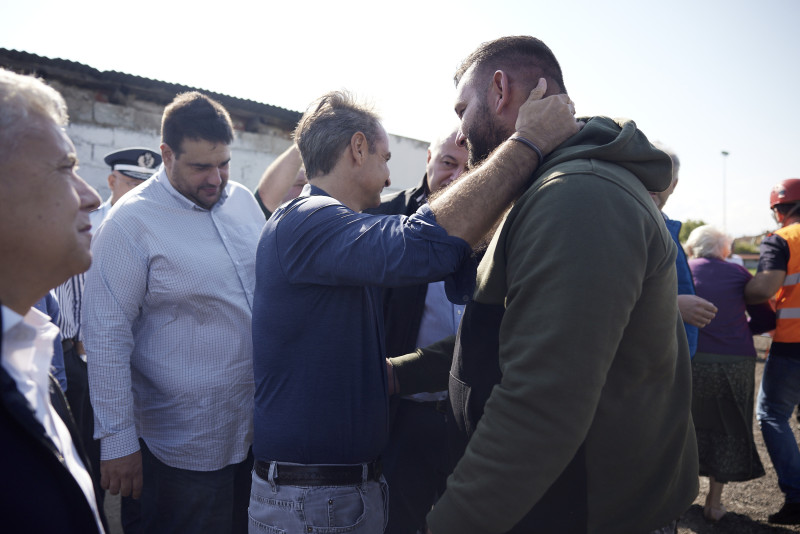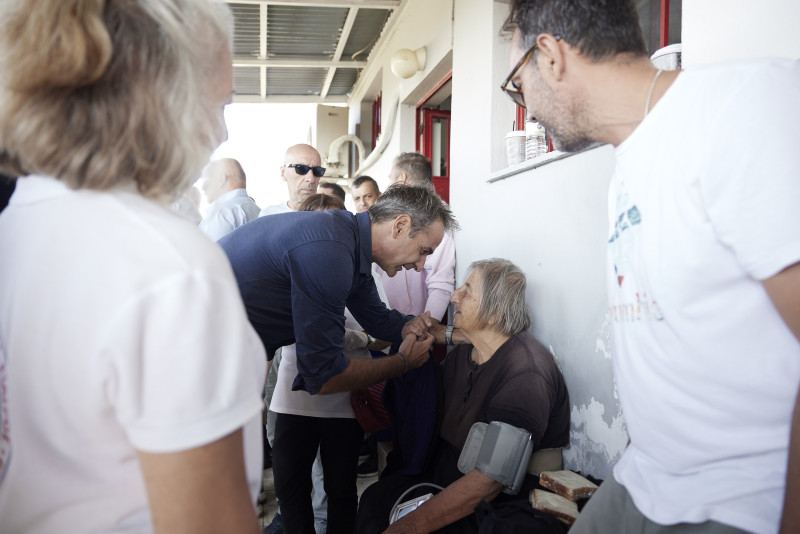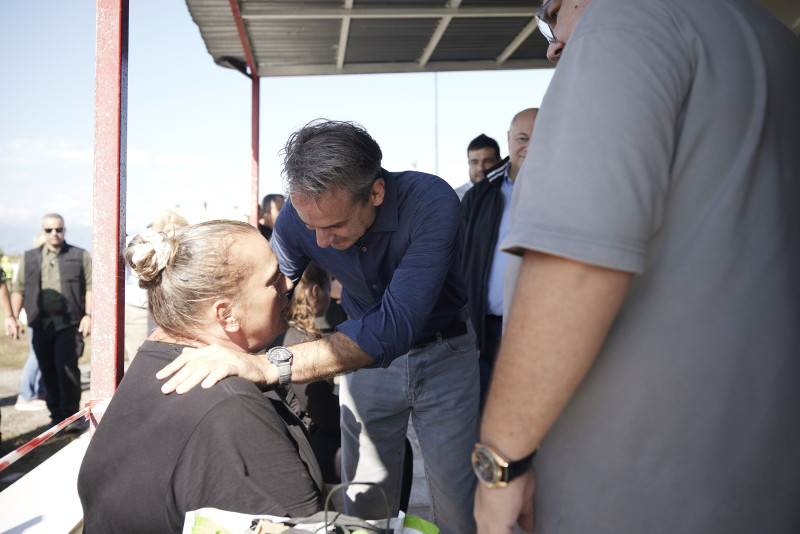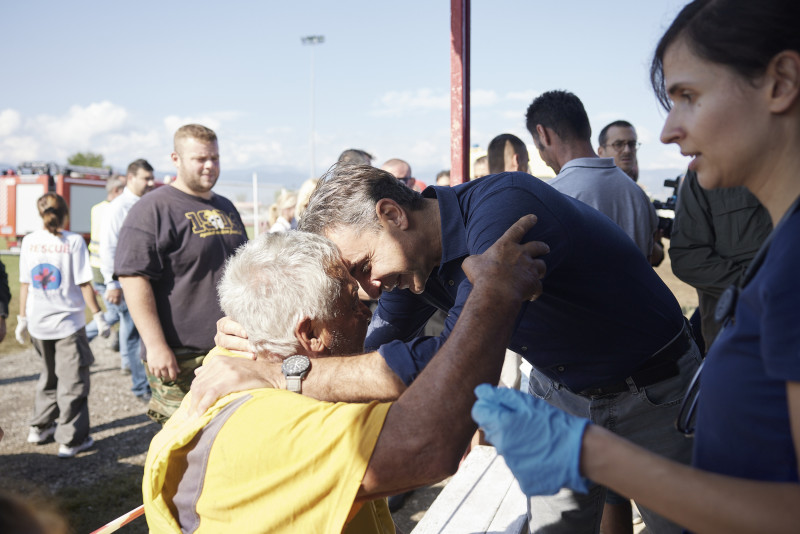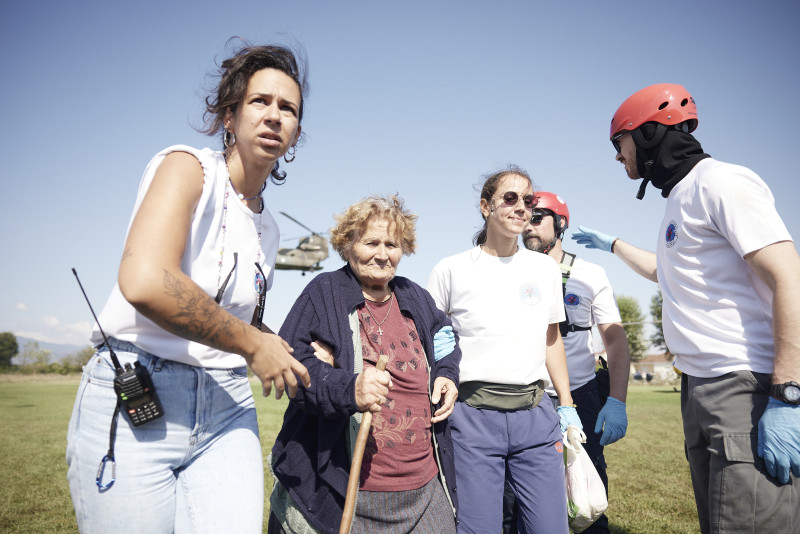“The first priority is the release of our fellow citizens”, stressed the Prime Minister – “The country faced the worst phenomenon in its history” – Request to Europe for international help
“The country has faced the worst weather phenomenon in its history,” said Kyriakos Mitsotakis from the coordinating body in Larissa, stressing that the recording of the damages and their restoration will begin immediately, as well as the relief of those affected.
The Prime Minister expressed his condolences to the relatives of the victims and asked the citizens to follow the instructions of the Civil Protection.
“The first priority is the release of our fellow citizens”, stressed Mr. Mitsotakis, as the insistence on locating and rescuing dozens of people is ongoing.
The Prime Minister also stated that he has submitted a request to the Commission for European support to the maximum extent possible, in order to deal with the consequences of the earthquake.
Earlier, Mr. Mitsotakis gave his assurance that after the rescue is completed as soon as possible and the release of people stranded in flooded communitieswhich also constitutes the absolute priority at the given timethe government will allocate whatever resources are required – national and community resources that will be claimed – for the compensation of those affected, the support of businesses and the rural world, the restoration of infrastructure and the implementation of the necessary projects in the PE of Karditsa and throughout Thessaly.
“We will do whatever it takes. I will also mobilize whatever European resources are available so that we can have additional support, to cover first of all the compensation needs of households. The records of the damage will begin immediately – households and compensation for the houses that have been destroyed.” noted Prime Minister Kyriakos Mitsotakis during the meeting he had with Mayors of the affected areas, at Karditsa City Hall.
The Prime Minister underlined that “I want you to know that we will do everything humanly possible. I understand both anger and rage. I never hid, I’m always here in difficult times. We’ll back up we will support the Self-Government”. He added how “We will find the money, whether it is national resources or European resources. There will be no – let me stress this – resource issue. There is a question of quick implementation of the projects. I say this because I know for myself how difficult it is when such extraordinary phenomena occur. But we are in a position, I will repeat this, to be able to manage it. And with the help of Europe.”
According to karditsalive issues raised according to information are the immediate ones such as rescues and the temporary housing and accommodation of flood victims or the restoration of the road network’s passability, but also those that need to be done at a later stage as it is the restoration of the infrastructure, but also of the houses as well as the launching of projects that will now aim at anti-flood shielding and not just in the protection that has been shown in practice not to be guaranteed in extreme weather events, such as those that affected Karditsa and all of Thessaly.
As was also said by the Deputy Minister of Internal Affairs, Mr. T. Livanio who accompanied the Prime Minister already signed a decision for emergency financing of the Municipality of Palamas mwith €1.5 million and the remaining Municipalities for €1 million while the Mayors were asked to immediately send documents to start the process of the first aid of €600 and then the recording of damages for the compensation. For all compensation and rehabilitation support procedures, the Janos model will be followed as mentioned.
The Prime Minister asked everyone for the maximum possible effort to deal with the effects of the bad weather which he said was Janos X3 and X4 in terms of its magnitude.
Fly over the affected areas
Before landing in Karditsa, Kyriakos Mitsotakis flew the helicopter over the affected areas in order to see for himself the scale of the disaster.
The meeting in Trikala
Immediately after Karditsa, the prime minister went to the area of Trikalawhere at the junction of Megali Kalyvia he was informed about the problems and had a discussion of immediate priorities with him Minister of Development, Kostas Skrekas, the Minister of Digital Governance, Dimitris Papastergiouthe Deputy Minister of the Interior Thodori Livaniothe Deputy Minister instead of the Prime Minister Yannis Bratakosthe Regional Governor of Thessaly, Costa Agorastothe Deputy Governor of Trikala, Christos Michalakis and the Mayor of Trikkaia, Nico Sakka. Then Kyriakos Mitsotakis left for the Business Center in Larissa.
The Prime Minister in detail at the meeting he said the following:
“My condolences to the relatives of the people who lost their lives and to say a big “thank you” to all those who fought and are still fighting a very unequal battle against a natural phenomenon the likes of which we have never seen before in the country, possibly in Europe. To know what we had to manage in absolute terms.
This is what all the experts tell us, it is not an excuse, but it is the reality. When 600, 700, 800 tons of water fall on an acre, that water will go somewhere, it will not disappear. What should have been done, what was done, what can be done better, we will discuss it in another year.
Right now what’s important: first, the salvation of people and the liberation especially of those in danger from the villages which we still do not have access to. As you have seen, from the first moment we were able to fly helicopters we mobilized every air vehicle at our disposal, including the helicopters we have at our disposal for forest firefighting. We ordered them, basically, to use them for evacuations, to be able to take people from where the helicopters could have access, either physical access, that is, to land, or with a hoist in the most difficult evacuation cases to bring them to Karditsa initially. For people to be safe, to have medical care, a plate of food and a possibility, in the first phase, through the Municipality and the support we will give, to be able to have the security they need. Many are in a state of shock, needing psychological support. We have already spoken to the relevant Deputy Minister and the President of the Medical Association so that we can treat people immediately.
I want until this evening – and I will return to the coordination afterwards – to be sure that anyone who needs evacuation, I stress this, I understand how unpleasant it is to be trapped in a house, possibly with other people. But our priority is on those we need to remove as soon as possible.
Right after that, after this exercise is over, we’re going to immediate network restoration -the Deputy Minister will stay here as long as necessary-, electricity, water and access.
I want us to have an accurate picture of the problems that exist on roads. I will ask for the same in Trikala, especially for the more mountainous villages. As for lowland villages, I understand the problem is water, but if a road has fallen, we need to know about it.
Let me focus on what the mayor said, we must have a picture of landslide phenomena. I will also speak, I will communicate directly with the competent bodies and with Mr. Lekkas, so that we have an image, that we do not suffer any further damage from soil erosion.
If we have cut roads, cut bridges -I think we’re starting to get a picture- to quickly restore access to the villages, for the villages to have physical access.
From there, it will start difficult and long-term restoration work. I’ll say it, and then I’ll say it to you because I want you to hear it from me: we’ll do whatever it takes. The Greek economy is now quite strong to be able to withstand such a disaster. I will also mobilize whatever European resources are available to be able to have additional support, to cover first of all the compensation needs of households. They will start immediately damage records -households and compensation for damaged houses.
Businesses, agricultural producers. We know that we have a big loss, but we have already mobilized ELGA so that we can find the relevant money to cover the losses of our producers. I have a first idea of where the problems are.
And the difficult issue, of course, and the expensive issue, which is the infrastructure restoration. Whether we are talking about roads, whether we are talking about networks, whether we are talking about dams, whether we are talking about new or old projects that need to be repaired.
But I will keep what you said, and this is beyond the responsibilities of each Region: the need for a holistic planning of the water management of the Thessalian plainsomething that has concerned us for decades now, at a central level and not necessarily with some projects which may be absolutely necessary – Mouzaki Dam, I prioritized it – studies later, but a dam this big is not built, as you know, overnight.
But we need another management now, because this phenomenon we had can be a once in 100 years phenomenon? At 500? And who tells us that we won’t have something milder, but still very problematic, two, three, four years from now? Because we already had two. And when I have two in a row in three years—because that wasn’t Janus, it was Janus times 3, times 4, just so we know what we’re dealing with—we have to be ready for any eventuality. Or at least, if we can’t be prepared for the absolute extreme, be prepared for the smaller ones, which are sure to happen with much greater frequency.
This is what I wanted to tell you. I want you to know that we will do everything humanly possible. I understand both anger and rage. I never hid, I’m always here when things get tough. We will put our backs, we will support the Self-Government.
I think the case of “Ianos” was indicative. This model worked well, with a large central contractor stepping in. We should now enlist practically all the construction companies in the country, all the big ones, divide the projects that need to be done and move quickly.
We will find the money, whether it is national resources or European resources. There will be no – let me stress this – resource issue. There is a question of quick implementation of the projects. I say this because I know for myself how difficult it is when such extraordinary phenomena occur. But we are in a position, I will repeat this, to be able to manage it. And with the help of Europe, which I will claim, and through national resources which we can find, mainly in terms of immediate needs”.
Source: Skai
I have worked in the news industry for over 10 years. I have been an author at News Bulletin 247 for the past 2 years. I mostly cover politics news. I am a highly experienced and respected journalist. I have won numerous awards for my work.


